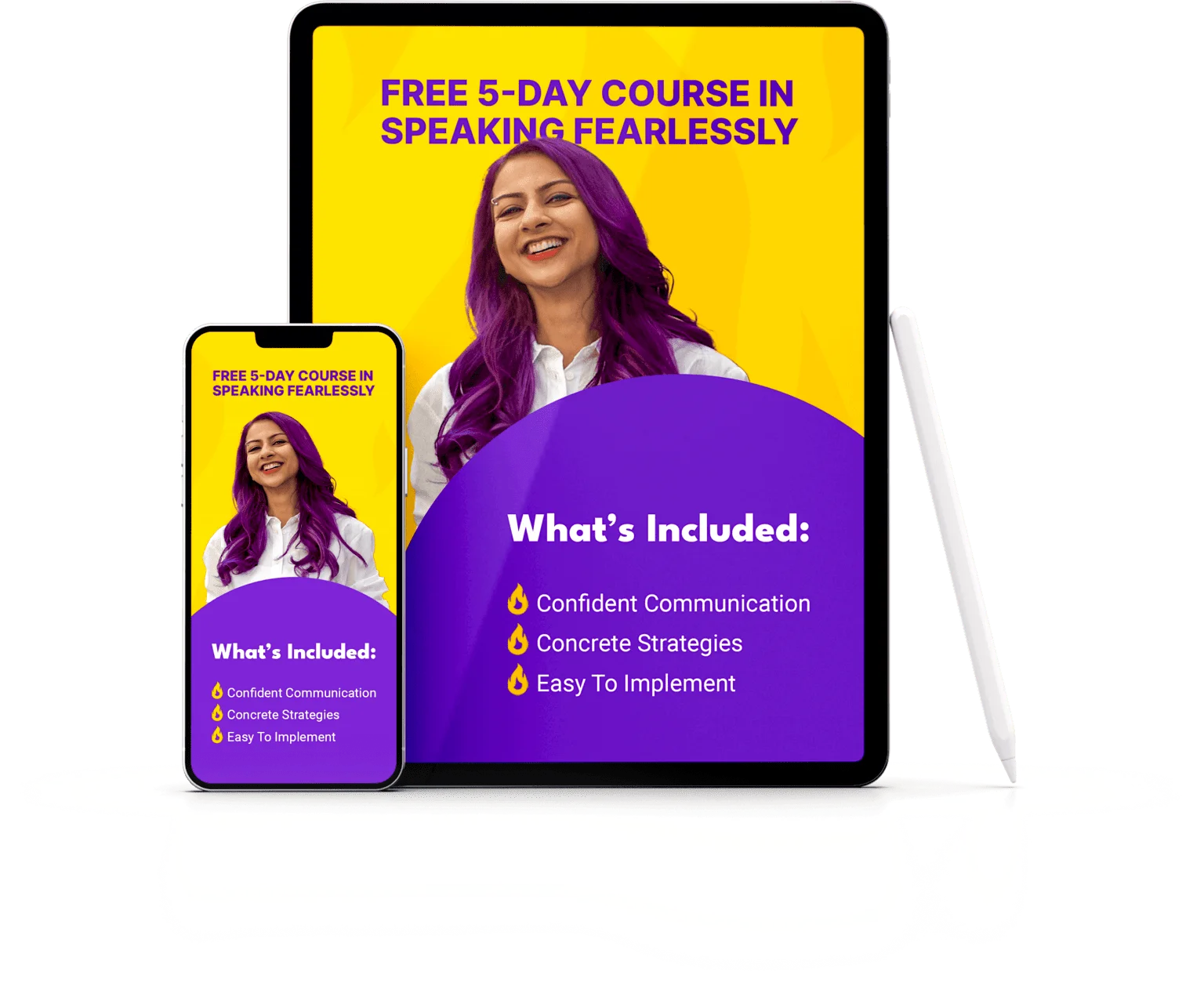Speaking in public has made a big difference in the lives of many leaders. Just look at Winston Churchill, Napoleon Bonaparte and Abraham Lincoln – their speeches changed history.
However, public speaking isn’t just about giving historical speeches that change the world. It’s about getting your ideas across in the best way, earning credibility and being recognized.
The goal of impactful presentations is to influence the audience and change mindsets. When you don’t deliver a presentation or talk well, you miss out on an opportunity to impress, influence and drive desirable action. Entrepreneurs who build influence create stronger networks, gain more clients and build their reputation faster.
As a public speaking coach, my aim is to help you speak as the most powerful, most influential version of yourself.
In this article, I will share five strategies that you can use to become influential and charismatic in any room or zoom – whether it’s a one-on-one conversation or a presentation on a stage.

Table of Contents
What is communicating with influence?
Speaking to influence others means talking in a way that makes people want to listen and agree with you. It’s more than just sharing facts. It’s how you sound and how you move to make people feel something and think differently.
When you speak with influence, you can make people excited, happy or even motivated to do something you want them to do. It can lead to them agreeing with your ideas or taking action based on them.

Speaking versus Influencing
Influencing is more than speaking well.
While presenting shares information, speaking with influence, also known as persuasion psychology, drives ideas into action and achieves results without coercion.

Image by DC Studio on Freepik
The benefits of influencing in public speaking
Being able to influence your audience means you can sway their opinions or decisions in your favor. This skill is crucial for entrepreneurs because it helps them overcome any resistance or skepticism from the audience.
Imagine delivering a webinar and addressing all your audience’s objections to buying before they’ve had a chance to bring them up.
Or speaking on a podcast and sharing compelling insights for your audience to start following you and investing in you as a personal brand.
An influential entrepreneur does not only deliver a message. They have the power to change hearts and minds and open wallets.

Strategies to become influential when you speak
Here are 5 strategies that you can use in your next sales call, podcast or webinar to increase your influence.

Image by katemangostar on Freepik
1. Words that Influence Perception
You have the power to change perception with your words. Instead of using words on auto-pilot, be more intentional with your choice of vocabulary so you can influence the outcome.
For example:
- Instead of saying “This is awful”, say “This is what we can do to improve”.
- Instead of saying “This isn’t the way things are done”, say “Here’s another solution”.
- Instead of saying “This will never work”, say “Let’s give it our best shot”.
Your choice of words can express agency, positivity, strength and empowerment – which are qualities you want to associate with your brand.

2. Metaphorical Framing
Metaphorical framing, conceptualized by an American cognitive linguist and philosopher George Philip Lakoff, helps us make sense of complicated ideas by comparing them to simpler, everyday things we know.
Lakoff believed these comparisons shape our cognition, influencing how we think, reason and communicate.

Image by Freepik
Using metaphors highlight the main points of your presentation. By comparing it to something familiar or easily understood, you unlock a number of benefits:
- Enhance Understanding
Comparing complex ideas to familiar concepts helps clarify them. For example, describing a challenging project as “navigating through a maze” makes it easier for the audience to grasp the complexity. - Increase Engagement
Metaphors can evoke emotions and create vivid mental images, making the presentation more memorable and engaging. For instance, likening achieving goals to climbing a mountain can inspire perseverance and determination in the audience. - Stimulate Creativity
Metaphors encourage creative thinking and problem-solving by prompting the audience to look at situations from different perspectives. For instance, describing a setback as a “speed bump” suggests a temporary obstacle that can be overcome with resilience and adaptability.
In a meeting, you can either be the conductor of the orchestra or the firefighter trying to save the house on fire.
See what I did there?

3. Vocal Mirrors

“Vocal Mirrors” refers to the practice of subtly adjusting various aspects of your voice to match those of the person you’re speaking to. This technique works well in two-way conversations like sales calls, podcasts and one-on-one meetings.
This includes matching:
- Tone
Matching the tone of the other person helps the speaker resonate with them emotionally and convey empathy. It ensures that your message is received with the intended emotional undertone, whether it’s seriousness, enthusiasm, or compassion.
Mirroring the tone of your prospective client on a sales call shows them that you’re on the same page as them – that you’re syncing and resonating.
- Pitch
When you align the pitch of your voice with that of the other person, you enhance your credibility and relatability. It creates a sense of harmony and makes the speaker’s voice more pleasant to listen to, fostering engagement and receptiveness.
- Pace
In order to deliver the message effectively without overwhelming or boring the audience, it is crucial to adapt and vary the pace of your speech. This ensures that the speaker can maintain the audience’s attention and comprehension levels throughout the presentation.
If you can mirror these vocal characteristics, you have a bigger chance of establishing rapport with your audience. This will make the other person feel more comfortable and engaged in the conversation or presentation.
Once you establish rapport and trust, you’re on your way to influencing – your audience will listen to you more deeply if you seem to be “one of them”.
4. Pygmalion Effect
German-born American psychologist Robert Rosenthal coined the Pygmalion effect, suggesting that if you think of yourself as confident and authoritative, others will perceive you that way.
In simpler terms, how you see yourself influences how others see you.
I always highlight to my clients the importance of mindset and self-perception in delivering impactful presentations. When we project confidence and positivity in our presentation, the audience is more likely to perceive us in the same light.
So, if you focus on feeling confident and positive, you can change how your audience sees and reacts to your talk, making you better at public speaking.
Pro tip: This is exactly why dressing to impress works!

5. The Pratfall Strategy
Nothing to do with Chris Pratt… or does it?
This is based on a pyschological phenomena called the Pratfall Effect.

Highly skilled people become even more likable when they look vulnerable. Social psychologist Elliot Aronson first studied this in 1966. He hypothesized that people seen as “better” than others may seem more attractive upon committing a small pratfall.
This strategy involves sharing stories of your failures and using self-deprecating humor to show your human side.
This makes you more likable and increases your perceived charisma.
It’s like when Chris Pratt shares his funny and relatable moments—it makes people connect with him even more.
I guess it has to do with Chris Pratt after all…
6. Verbal Judo

Based on the book Verbal Judo by George J. Thompson and Jerry B. Jenkins, this technique shows how to talk in a way that helps you connect with others, diffuses difficult situations, and gets people to work with you, especially when times are tough.
At the core of Verbal Judo is the principle of redirection: When things get negative, acknowledge the speaker’s point of view. Then redirect the conversation in a constructive direction. This is a gentle yet powerful way of persuasion that helps us avoid, resolve and manage resistance.
Here’s a step-by-step guide to using the Verbal Judo technique in public speaking:
- Understand your audience.
Know who you’re speaking to and what their concerns or objections might be. - Practice active listening.
Listen to your audience’s questions or concerns without interrupting. Show that you understand their perspective. - Acknowledge their point of view.
Validate your audience’s concerns or objections before presenting your own perspective. - Redirect the conversation.
Once you’ve acknowledged their concerns, steer the conversation towards your key points or desired outcome. - Use positive language.
Frame your message in a positive and constructive way to maintain rapport and encourage cooperation. - Remain calm and confident.
Maintain a confident demeanor and stay calm, even if faced with challenging questions or objections. - Provide solutions.
Offer solutions or alternatives to address any concerns raised by your audience. - Seek agreement.
Look for areas of agreement or common ground to build rapport and facilitate understanding. - Close with confidence.
Summarize your key points and end with a clear call to action or takeaway message.
By following these steps, you can effectively use Verbal Judo techniques to navigate public speaking situations with confidence and skill.

Conclusion
These strategies are your tools. But, you have to adjust them depending on whether you’re trying to convince someone in a chat or speaking to a big group.
Being a good public speaker can change your life. It will open doors for you that you never believed you had access to. Want help in building your influence and credibility when you speak? Let’s talk!



